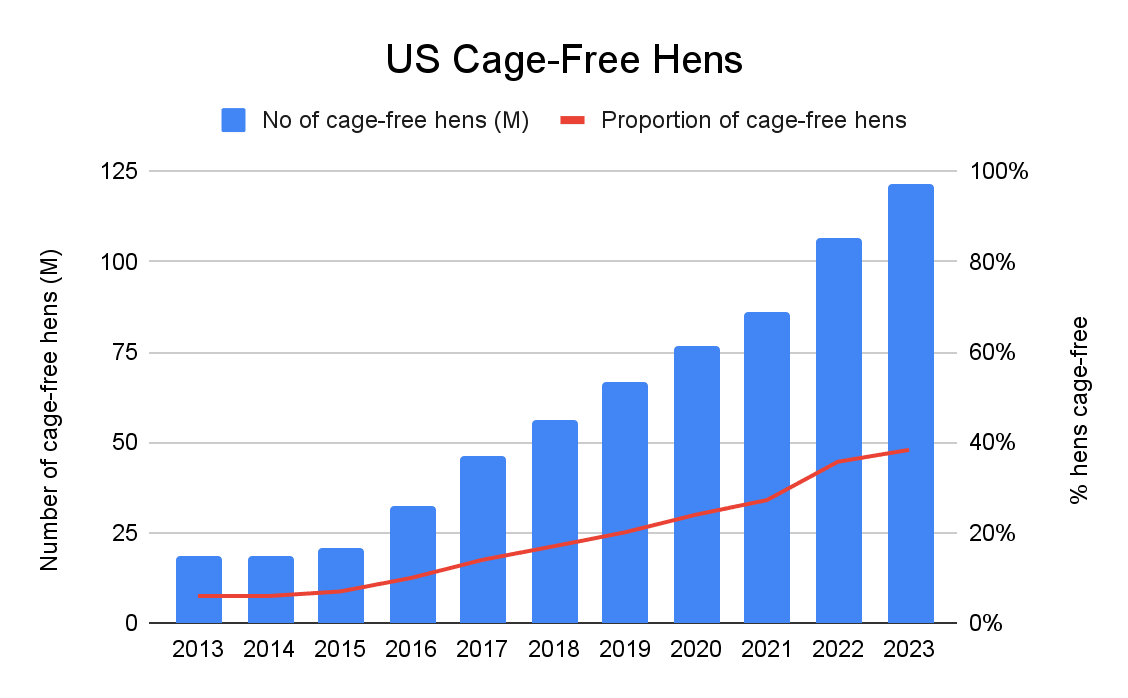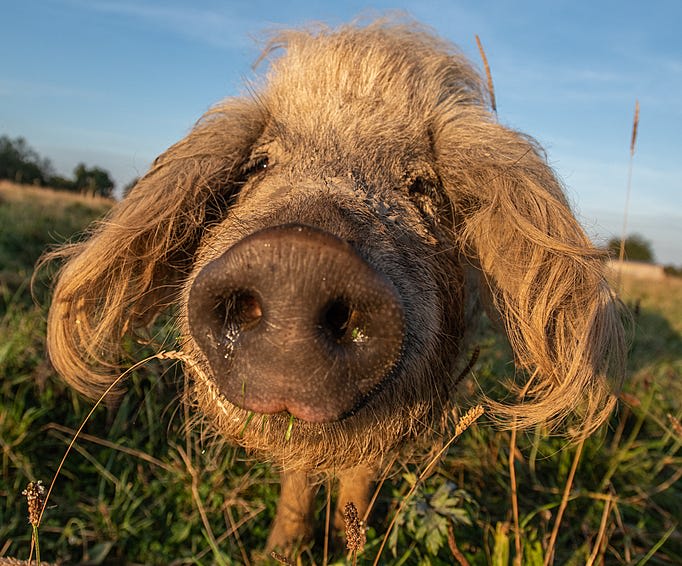This is a crosspost for A year of wins for farmed animals, published by Lewis Bollard on 14 December 2023 in Open Philanthropy farm animal welfare research newsletter.
It’s been a tough year for farmed animals. The European Union shelved the world’s most ambitious farm animal welfare reform proposal, plant-based meat sales sagged, and the media panned cultivated meat while Italy banned it. But advocates for factory farmed animals still won major gains — here are ten of the biggest:
1. Wins for the winged. Advocates won 130 new corporate pledges to eliminate cages for hens or the worst abuses of broiler chickens. This progress has now expanded well beyond the West: recent wins include cage-free pledges from the largest Asian restaurant company and the largest Indonesian retailer. That’s mostly thanks to the work of the 100+ member groups of the Open Wing Alliance, who now campaign across 67 countries. We estimate that, if fully implemented, pledges secured to date will reduce the suffering of about 800 million layer hens and broiler chickens alive at any time.
2. Cages canceled. A fair question has long been whether these pledges will be implemented. So far, they mostly have been: 1,157 corporate pledges are now fully implemented, 89% of the pledges that came due by last year. As a result, 39% of American hens, 60% of European hens, and 80% of British hens are now cage-free, up from just 6%, 41%, and 48% respectively a decade ago. There’s still a lot more work to do to hold companies accountable to their pledges. But globally 220 million more animals are already out of cages thanks to this work.

3. Pigs Supreme. The US Supreme Court upheld California’s Proposition 12, which bans the sale of eggs, pork, and veal from caged animals and their offspring. This ruling also protects seven other similar state laws. Once fully implemented, these laws will collectively require about 700,000 pigs and 80 million hens be raised cage-free. Advocates are now fighting a last-ditch effort by pork producers to overturn the Court’s ruling, and have already mustered the support of over 210 members of Congress for our side.
4. Plant-based policies. Denmark unveiled the world’s first state action plan to promote plant-based eating, including plans to promote plant-based foods in schools and support innovation in alternative proteins. South Korea said it would soon unveil one too. The European Parliament called for an EU-wide “action plan for increased EU plant-based protein production and consumption.”
5. Meaty milestones. For the first time, the COP28 climate summit served mostly vegetarian meals. The UN Environment Program released the first-ever UN report on the potential of alternative proteins. New data showed that only 20% of Germans now eat meat every day, down from 34% eight years ago. Half of all US restaurants now offer a plant-based alternative, up from a third five years ago.
6. Cultured policymakers. US regulators approved the nation’s first sales of cultivated meat. Japan’s Prime Minister pledged support for the nation’s cellular agriculture industry. Germany pledged €38M to promote alternative proteins, while Catalonia (Spain), Israel, and the UK funded more research. Alternative proteins have now attracted over a billion dollars in public funding committed to research and infrastructure globally.
7. Alternative aspirations. Major German retailer Lidl pledged to double the share of its range of proteins that are plant-based by 2030. The second largest Dutch retailer, Jumbo, set a goal for 60% of its protein sales to be plant-based by the same year. Both began their efforts by slashing the price of their own plant-based brands to parity with meat. So too did Germany’s largest retailer, Kaufland. Eight of France’s largest food companies, including Carrefour and Unilever, jointly pledged to generate €3 billion in sales from plant-based products by 2026.

8. Creature comforts. Denmark’s government agreed to help phase out fast-growing broiler chickens, who suffer from chronic pain. The US Department of Agriculture announced new guidance to weed out fake “animal welfare” claims on products and strengthened animal welfare standards for organic products. And the UK government advanced a long-awaited live export ban.
9. Crustacean codes. The UK’s largest seafood business, Young’s Seafood, adopted one of the world’s first crustacean welfare policies, as did UK retailers Waitrose and Marks and Spencer. This year’s Global Shrimp Forum featured its first-ever session on shrimp welfare. The Shrimp Welfare Project has now reached agreements with shrimp producers to ensure pre-slaughter stunning for over a billion shrimp annually.
10. Fish, finally! The EU established the world’s first reference center for fish welfare. Two of the world’s biggest aquaculture sustainability certifiers, the Aquaculture Stewardship Council and Friends of the Sea, moved forward with mandatory animal welfare standards. We estimate that, once implemented, these standards will improve the welfare of two to six billion fish alive at any time.
None of this progress just happened. Almost all of it came thanks to the tireless work of advocates, enabled by the generosity of donors. Many of both read this newsletter. So let me say: I’m deeply grateful for all you do.
We face a mighty challenge: ending the abuse of more sentient beings than humans who have ever lived on earth. We do so with few resources: all advocacy for farmed animals globally has a combined budget smaller than the New York Metropolitan Museum of Art. And yet we’ve already achieved progress for billions of sentient beings.
I know this work can be emotionally-draining, discouraging, even infuriating. Everything we do feels small compared to the scale of suffering before us. And yet you keep working and donating, with patience, generosity, and compassion, to help those who can’t help themselves. The best people always have.
Thank you. And happy holidays.

I'm curating this post — and I'd love to see more reflections on 2023 from other perspectives and fields. (Thanks for cross-posting it!)
This is wild. I wanted to find some estimates; it looks like this report estimates that around $200M was spent on farmed animal welfare in 2020 (with around 10% growth per year, and not counting industry investments into alt proteins), which makes things look pretty close to the Met's budget.
Some semi-related posts you might appreciate if you appreciated this one:
As a side note, I feel conflicted about the post's title (or newsletter's subject line); the first sentence seems to disagree with the title and I don't know if I'd characterize the year as "a year of wins for farmed animals." (E.g. my sense is that the number of chickens kept in extreme confinement has increased globally, and the trend isn't changing.) I think it can be very useful to focus on wins sometimes, but I'd change the title to something like "some big wins for farmed animals."
Finally,
+1 from me. (Bold mine.)
Is this the first time the EA Forum has had an impact story that affected over 1 billion individuals?[1]
I know that there are many instances of things which [arguably] on expectation will affect >1 billion individuals, but I'm wondering if this is the first time that we can concretely point to 1 billion individuals who have been helped past-tense.
Thank you so much for crossposting this!
!!
So if:
Then: It's ~2,500 times more cost-effective to donate to a cage-free campaign than to buy cage-free eggs instead of caged eggs.[1]
While I agree that we shouldn't take expected value estimates too literally, that's one hell of a multiplier. And even if ethical offsetting is generally antithetical to EA values, if your goal is to get chickens out of cages, an estimated 2500x multiplier on the margin[2] is a powerful challenge to buying cage-free eggs yourself.
"You shouldn't be buying eggs at all!" I hear you cry. Why not? Because personally boycotting commercial egg production robustly makes you >2,500 times more persuasive as an animal welfare advocate? Because being free to consume egg-based products would make such a negligible difference to your productivity over the rest of your life, that it would never lead to you earning an additional $1.50?[3] Indeed you never spend more than $1.50 to give yourself the kind of benefits (yes, benefits) you'd get from being free to consume eggs for the rest of your life?
Epistemic status: Sitting in a cafe in a country with ~no cage-free eggs staring hungrily at a breakfast menu consisting entirely of egg-based options considering breaking my no-meat-or-caged-eggs diet while KC and the Sunshine Band sing Give It Up over the cafe speakers and wondering if the universe is telling me to give up rationalising eating tasty food or to give up rationalising looking more altruistic.
75*300/(1/0.11)
Obviously if no one bought cage-free eggs, no one would produce them.
Here, I'm assuming that cage-free campaigns affect 75 chicken-years per dollar (as above), that you'd otherwise eat 200 caged eggs a year, that commercial hens produce 300 eggs a year (as above), that you live another 75 years, that—very speculatively—going cage-free removes 50% of the suffering, and welfarism.
Note that rather than exhibiting regression to the mean over time, this is remarkably ~15x larger than ACE's 2015 estimate for online ads.
Nice points, Holly!
I had estimated donating "0.147 $/year" to corporate campaigns for broiler welfare is enough to cancel all suffering caused to farmed animals per person per year (not just that linked to eggs). However, I still think eating predominantly whole-food plan-based makes sense from an altruistic perspective:
BMK=benchmark diets. FLX=flexitarian diets. PSC=pescatarian diets. VEG=vegetarian diets. VGN=vegan diets. Veg=diet variant high in fruits and vegetables. Grn=high-grain diet variant.
Thanks for sharing! I found it funny.
Calculated based on values in Table 1.
Mean of the 3 estimates in Table 3.
This is indeed encouraging to hear! I’ve recently been made aware of so much tragic news for the animals (the Italian cellular agriculture ban the most egregious, just as I see it), so to hear that anything good is happening is uplifting. It’s especially important that crustaceans’ welfare is finally being addressed and attended to, when they were ignored for so long.